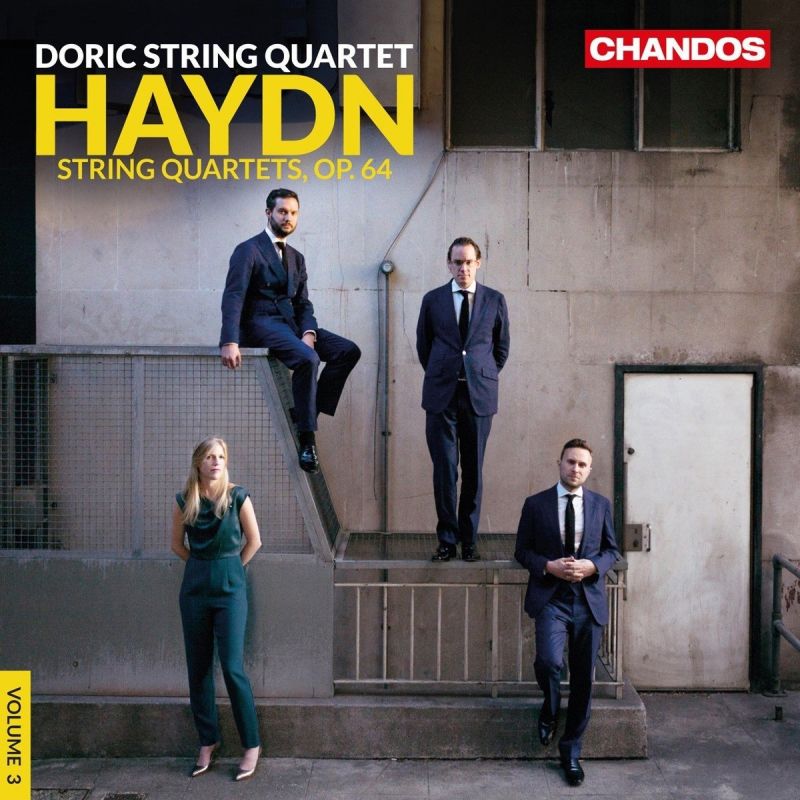HAYDN Six String Quartets, Op 64 (Doric Quartet)
View record and artist detailsRecord and Artist Details
Composer or Director: Joseph Haydn
Genre:
Chamber
Label: Chandos
Magazine Review Date: 04/2018
Media Format: CD or Download
Media Runtime: 142
Mastering:
DDD
Catalogue Number: CHAN10971

Tracks:
| Composition | Artist Credit |
|---|---|
| (6) String Quartets, 'Tost III' |
Joseph Haydn, Composer
Doric String Quartet Joseph Haydn, Composer |
Author: Richard Wigmore
While the Doric are incapable of a dull or unconsidered phrase, their liberties with tempo and silence can be extreme. A case in point is their faltering opening of No 2, presumably to underline the initial uncertainty of key (a suggestion of D major brusquely contradicted by B minor). But does Haydnesqe deception, here and elsewhere, need this kind of underlining? The colours the Doric distil in this troubled, gawky movement are typically vivid, from the raucous pizzicato twangs at the end of the exposition to the mysteriously remote bare octaves in the development. Yet, listening ‘blind’, few would guess that Haydn marked the movement Allegro spiritoso. For my taste they also exaggerate the contrast between the quasi-Mozartian elegance of the opening of No 3 and the zanily galloping cello – I want to hear this absurd incongruity ‘straight’, at least first time round. Most extreme of all are the tempo fluctuations in the first movement of No 4. The wholesome, Haydnesque tune on the violin’s G string at the end of the exposition is a moment of necessary resolution after the previous harmonic instability. The Doric distend and cosset it, enervatingly, and then outdo even themselves when it returns at the end of the movement.
If they can underestimate the element of robust directness in Haydn’s musical persona – and in the process blur his symmetries – the Doric are consistently illuminating in the slow movements, which rival the Lindsays (ASV, A/01, 4/02) in hushed, musing eloquence and surpass them in beauty of tone. Leader Alex Redington burns into his impassioned zingarese lament at the centre of No 6’s Andante with feverish abandon, while his colleagues’ minute attention to the shaping and balance of the lower parts makes the first-violin-dominated Adagios of Nos 2, 4 and 5 far more than touching accompanied solos. And while there are moments where I wish the Doric would resist their urge to question and deconstruct the music, Nos 5 and 6 are profoundly satisfying throughout, their first movements amply spacious, the minuets unpredictably and wittily timed, and the finales – high-class show-off music if ever there was – breathtaking in their mingled precision, delicacy and whooping high spirits. The recording, as in previous issues, is in the demonstration class while Dean Sutcliffe’s notes, like the playing, are guaranteed to make you hear these quartets with fresh ears.
Discover the world's largest classical music catalogue with Presto Music.

Gramophone Digital Club
- Digital Edition
- Digital Archive
- Reviews Database
- Full website access
From £8.75 / month
Subscribe
Gramophone Full Club
- Print Edition
- Digital Edition
- Digital Archive
- Reviews Database
- Full website access
From £11.00 / month
Subscribe
If you are a library, university or other organisation that would be interested in an institutional subscription to Gramophone please click here for further information.




